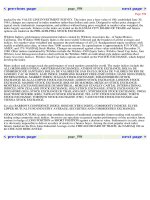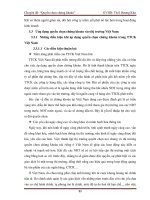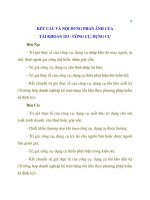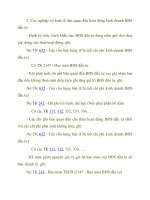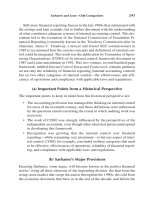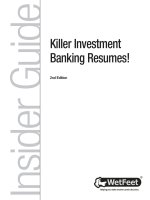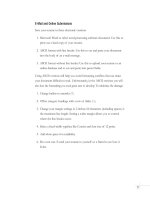Insider GuideKiller Investment Banking Resumes 2nd phần 9 pot
Bạn đang xem bản rút gọn của tài liệu. Xem và tải ngay bản đầy đủ của tài liệu tại đây (108.89 KB, 12 trang )
86
Andover Place
LLoonnddoonn
NNWW66 55EEFF
77 MMaayy 22000044
Dear Sir/Madam,
I am in the second year of an Accounting and Finance degree at London School of Economics and
am looking for a summer internship at your company.
During my degree programme I became very much interested in how investment and corporate
finance institutions operate. I have been taught pure accounting techniques and ways of reporting
and managing information, and also different economic and financial concepts. I would, therefore, like
to use my internship to put my knowledge to practice and learn more about the interactions of
markets and how individual business units operate. Your current team leaders initiate deals and
orchestrate projects all round the world. They work constructively and efficiently to ensure client
access to full range of products and high quality expertise. I would like to be part of this.
I am attracted to work in an environment with highly dynamic people which you employ, where
good client relationships and teamwork to deliver high results help to achieve successful joint
ventures with big conglomerates such as Lehman Brothers and high profits from projects such as the
one on Izodia, taken up last year.
I have good analytical and numerical skills which I have acquired during my studying at college
and university. I can do problem solving accurately in under-pressure conditions either by working
independently or with a group of people. Not only do I work well with numbers, but I can also
interpret them and come up with relevant ideas and suggestions that can be vital in business
success.
I am also very communicable. Apart from English, I speak four other European languages, which
can be very useful when interacting with the clients. French and German are widely used in
continental Europe, and Russian and Ukrainian may come in useful since the international markets
are expanding and there is a great scope of investment opportunities to eastern parts of Europe.
I am available for interviews any time now and can start the internship programme from the 20
June 2004 until October 2004.
Yours Faithfully,
Kathryn Smith
Recommendations for Kathryn Smith’s Letter
This letter has almost all of the right elements: It begins with a statement of
what Kathryn wants and why; shows that she’s done research on the firm; and
tells why she would be a good candidate. However, the letter is a bit wordy and
could benefit from editing. As well, her reason for targeting this particular firm
reads a bit too much like language directly from the company brochure. Add to
that the fact that though she’s obviously done research about the firm, she hasn’t
taken the time to find a specific person to send her resume to. Also missing is
an action statement at the end.
Kathryn’s also forgotten to say when she will call to follow up. And she hasn’t
included a phone number or e-mail for follow up. The contact information
should appear in both the cover letter and resume since the two documents
may get separated.
87
Here then is Kathryn’s new and improved letter.
88
Andover Place
LLoonnddoonn
NNWW66 55EEFF
77 MMaayy 22000044
ABC Investment Company
London, England
Dear Ms. Carsen:
I am in the second year of an Accounting and Finance degree at the London School of Economics
and am looking for a summer internship at your company. During my degree programme, I have
become very much interested in how investment and corporate finance institutions operate, and I
would like to use my internship to learn more about the interactions of markets and how individual
business units operate.
I am attracted to ABC Investments because of your dynamic work force. I’d like to be part of a team
that can participate in joint ventures with notable firms like Lehman Brothers on projects such as the
one on Izodia, taken up last year. My analytical skills are strong, and I can solve problems accurately
in high-pressure conditions. I can also interpret numbers to come up with relevant ideas and sugges-
tions. In addition to English, I speak French and German which are both widely spoken in continental
Europe, and my Russian and Ukrainian may be useful since there is a great scope of investment
opportunities in eastern Europe.
I am available for interviews any time and can start the internship programme as early as 20 June
2004. I plan to call for an appointment next week. If you’d like to contact me in the meantime, please
call xxx-xxxx. I appreciate your consideration.
Yours faithfully,
Kathryn Smith
Getting Your Foot in the Door
Now that you have a great resume, what should you do with it? Investment
banking firms receive resumes through three primary channels: campus recruiting
programs, employee recommendations, and “over the transom”—directly from a
candidate, unsolicited or in response to an ad. Insiders say that your chances of
getting an interview vary significantly depending on which channel you use. But
whatever the channel, timing is very important. It’s best to investigate the firm’s
recruiting cycle, which usually gears up around September and October for full-
time hires or January for summer hires. This is when firms are most likely hiring
and determining the headcount they’ll need for the following year.
Campus Recruiting
The best way to get into a firm is to go through the campus interviewing process.
All top firms purchase resume books from graduate schools and select candi-
dates to interview from them. They also interview on many campuses. Most
firms actively recruit at the top colleges and business schools. These days firms
are very anxious to get the best and brightest people, and since they are already
expending the energy to come to a campus to interview candidates, they feel
they should interview as many as possible. If you aren’t selected by the firm for
an interview, bid what points you must to obtain an interview. If the firm you’re
targeting does recruit on your campus, it’s a good idea to attend the information
sessions usually offered a few weeks before interviews. Many insiders say they
are more likely to spend extra time reading a resume and even giving the benefit
of the doubt to a candidate who has expressed interest in the firm by attending
events and making an effort to meet some of the team members there.
89
“Even at core schools, if you just put in your resume and your name is not
familiar, you won’t be successful,” says a recruiter. “Somehow you have to get
yourself out there.” Recruiters suggest that a favorable personal impression may
even compensate for weak points on your resume. “You can cancel out a lower
GPA by meeting people,” says one insider. “They’ll also give you credit if you’ve
done a lot of research.” You can use the information session and other events
as an opportunity to start proving your communication skills. Getting a check
in that box of the Big Four characteristics will put you ahead of the game when
resumes are reviewed.
Personal Contact
If you’re not currently in school, or if you are, but not at one where firms recruit,
you’re going to have a greater challenge on your hands. Insiders unanimously
agree that your best bet is to try to find someone you know at the firm or some-
one who has a contact at the firm. Look into your school alumni directories to
see if any graduates are working there. Or get a contact name in the industry or
product group in which you have relevant experience. Call the switchboard and
ask for names if you must.
The best route is to call the contact person, give him or her your 15-second
resume summary, and ask for information about the firm. You have two objec-
tives in doing this: to get more information on the firm to use in your interview,
and to get that person to ask for your resume so he or she can forward it to the
right person. Once you have a contact, send your resume to that person. Ideally,
the contact will forward the resume to the person who reviews resumes and
schedules interviews, with a note asking that an interview be granted.
With a strong resume and a recommendation, you’re probably a shoo-in. Insiders
say that an employee recommendation strongly affects the decision to interview
90
a candidate. Though we don’t have statistics, all agree that your chances of get-
ting an interview through a personal contact go way up, even if your resume is
less than stellar.
Over the Transom
If you strike out in the personal contact arena, your resume really counts. It’s
the only tool you have to sell yourself, and it represents your only chance to get
a foot in the door. When submitting your resume, whether in response to a job
listing or without solicitation, target firms that are likely to be interested in your
background. Specialization, to the greatest extent possible, is probably your best
angle. You have a better chance of getting an interview if someone with a simi-
lar background, who has needs in your area of expertise, reads your resume.
Most large firms now use an online application system accessible at their website.
You’ll be directed to complete certain database fields and/or cut and paste your
resume into a designated field. Once part of the system, your education and
experience can be matched against job descriptions. This is where your keyword
research can really help. Make sure your resume is chock full of nouns and short
phrases describing your Big Four characteristics. If your resume gets a sufficient
number of keyword hits, only then will it be reviewed by a live person, a
recruiter in the specific practice area.
91
Following Up
Do not become a nuisance, but do be persistent. After all, many firms look for
people who take initiative and are good problem solvers.
Here are a few basic rules for following up once you’ve sent your resume:
• Be persistent but not pesky—two calls or e-mails in one day are overkill; two
contacts in one week are probably fine.
• Be prescriptive in your requests—ask specifically for what you want, whether
it’s to schedule an interview or have a casual chat on the phone.
• Keep the ball in your court—you’ll probably feel more in control if you can
plan the next steps rather than wait by the phone.
• Make yourself easily available—provide a number where a message can be
left at any time; if possible, plan to travel to the firm’s office for a meeting at
your expense.
The Phone Fandango
You don’t want to get into a game of phone tag with an investment banker.
You will lose every time. Insiders say that one of the most difficult things to
do is return phone calls while working on a deal. E-mail is the more preferred
method of contact, and often a combination of phone and e-mail contacts will
produce results. Put yourself in the shoes of the average investment banker,
trader, or salesperson with recruiting responsibility. You’re working 100 hours
on a merger or stuck at your trading desk all day as the market goes wild . . .
93
Here’s what happens when an associate in M&A listens to your voice mail on
Wednesday at 11:59 p.m.:
You: This is Merrill Morgan calling on Wednesday at 10 a.m. I sent you my
resume on Monday and wondered whether you’d had a chance to take a look
at it. I’ll be in all day today, at 333-555-8956.
Associate thinks: “Who is Merrill Morgan, and why is he calling me?”
He has certainly not seen the resume—he hasn’t even been in the office since
last Friday. And he surely doesn’t have time to return your call without commit-
ting a time-zone foul. When he finally gets a few minutes free with access to a
phone, he’s more likely to call his significant other or pet poodle than to return
a phantom resume call. Most likely your voice mail gets deleted without much
more thought.
Message Magic
Here is a better approach:
You send an e-mail message that is brief and to the point: I’m Merrill Morgan,
an MBA candidate from Fuqua with experience in the M&A group at UBS. At
John Smith’s request, I sent my resume to you on Monday. I would like to sched-
ule an interview and will call you on Friday to discuss my qualifications.
Associate thinks: “Hmm, I remember this resume, and it’s probably worth seeing
him. I’ll call John to get more information before he calls me back on Friday.”
In this case, you left a brief message with some information on your background
so the associate would remember seeing the resume. You were specific about
your plans to call back on Friday, which gives him an opportunity to check with
John Smith.
94
If you’ve left a message, and don’t get a response, don’t hesitate to try again.
Remember, investment bankers are usually fully booked during the day and
often work late into the night, when the last thing on their minds is returning
resume calls. The best tactic is to be persistent and pleasant without badgering.
Most insiders say they usually make an effort at least to respond, even if they
aren’t interested in interviewing the candidate. “With a Blackberry, I can e-mail
from anywhere fairly quickly,” says an insider. Don’t give up until you’ve tried at
least three times over 2 weeks to contact the recruiter.
If you’ve left three messages and all have been ignored, you may want to send
your resume to someone else and start the process again. Another option is to
contact a recruiting coordinator or the banker’s assistant if one exists, and deter-
mine the best method of contacting your target. Many firms communicate
primarily through e-mail, although you might have luck using voice mail or even
leaving a good old-fashioned message with the secretary. Tailor your approach
to what you have learned about how that particular firm communicates.
Note: If you don’t reach the banker, your treatment of the recruiting coordina-
tor or secretary should be positive and respectful. Treat any person at the firm
the same way you would the professional responsible for reviewing your resume.
We know of more than one candidate rejected by the recruiting coordinator
because of an attitude!
95
Interview Prep
Many insiders say they develop interview questions according to experience
mentioned on a candidate’s resume. The best way to prepare for the first inter-
view is to know your resume extremely well. Develop and practice a 20- to 30-
second pitch that summarizes your experience and major achievements You will
use this countless times, especially in interviews for sales and trading positions,
to introduce yourself over the phone or in an interview when the interviewer
has not had a chance to review your qualifications. Preparing your pitch will
help you articulate the items listed on your resume. You should be able to describe
points on your resume in a clear, concise, and convincing manner. You should
also be prepared to discuss each area of your Experience section, providing
details and insight wherever possible.
Resume Watchouts
As we have mentioned, your resume will help the interviewer identify areas to
probe during the first interview. In particular, interviewers will look for weak-
nesses or inconsistencies to check, and may even formulate questions directed
at your resume weaknesses. Read your resume with a critical eye, looking for
things that might appear odd or inconsistent. Use the list below to help you
identify those areas that are of particular concern to interviewers.
Inconsistent Performance
If your accomplishments appear strong in one area and weak in another—1400
on the SATs with a 3.2 GPA, honors graduate of a top school with no notable
professional accomplishments—you should expect questions about this disparity.
97
The interviewer will want to know the reason behind your low GPA (did you
work part time during school?) or your mediocre experience. Be prepared to
explain any circumstances that impacted your performance, but again, avoid
undue personal detail.
Time Gaps
One reason interviewers like chronological resumes is that they want to know
whether a candidate took time off between school years or jobs. “I absolutely
hate big gaps of time. It’s one of the things I notice first,” one recruiter says.
But don’t compensate by trying to hide the breaks—you’ll only annoy the reader.
Time off is not necessarily a bad thing, but you need to be prepared to explain
any lapses between jobs or between your sophomore and junior year, for example.
If the break is a year or longer, you might address it in your cover letter. If you
did something as notable as volunteering in a foreign country or climbing Mt.
Kilimanjaro, include it on your resume.
In the interview be clear and focus on what you accomplished during that time.
Whether you took time off to travel, have a baby, resolve a personal issue, or
“find yourself,” you need to practice your answer to the time gap question. It’s
usually best not to go into a lot of personal detail—insiders say this is a warning
sign, especially in the first interview. Firms want to be sure you can handle the
normal rigors of 4 or more years in academia, jobs with increasing responsibility,
and balancing your personal and professional lives.
Job Hopping
If you’ve been at several companies in just a few years, or never stayed at one
company longer than a year or two, you risk being perceived as a job-hopper.
Your interviewer may wonder whether you’ve been fired for poor performance.
Frequent career changes sometimes indicate that a person has difficulty sticking
with a situation, working through problems, or committing to a job. All of these
98
99
are obvious concerns to investment bankers, whose work requires tenacity and
a strong commitment to delivering client value. In addition, most firms look for
people who want to stay around for a while. Three years is often considered a
breakeven point, but many firms would like individuals with longer-term tenure
in mind.
Local Yokels
If you’ve spent most of your academic and professional life in Boston, you
may be questioned about your sudden interest in joining the Chicago office of
a firm. This is especially true for those who have attended school and worked
in California. Midwest and East Coast firms have a terrible time getting these
candidates to relocate, and in some cases they have all but given up trying. A
firm that must fly you out for an interview will probably quiz you over the
phone before anteing up.
Next Steps
1. Check out investment banking Company Profiles at www.wetfeet.com.
2. Browse the WetFeet.com store for our Insider Guide to Careers in Investment
Banking as well other Insider Guides to top I-banking firms.

